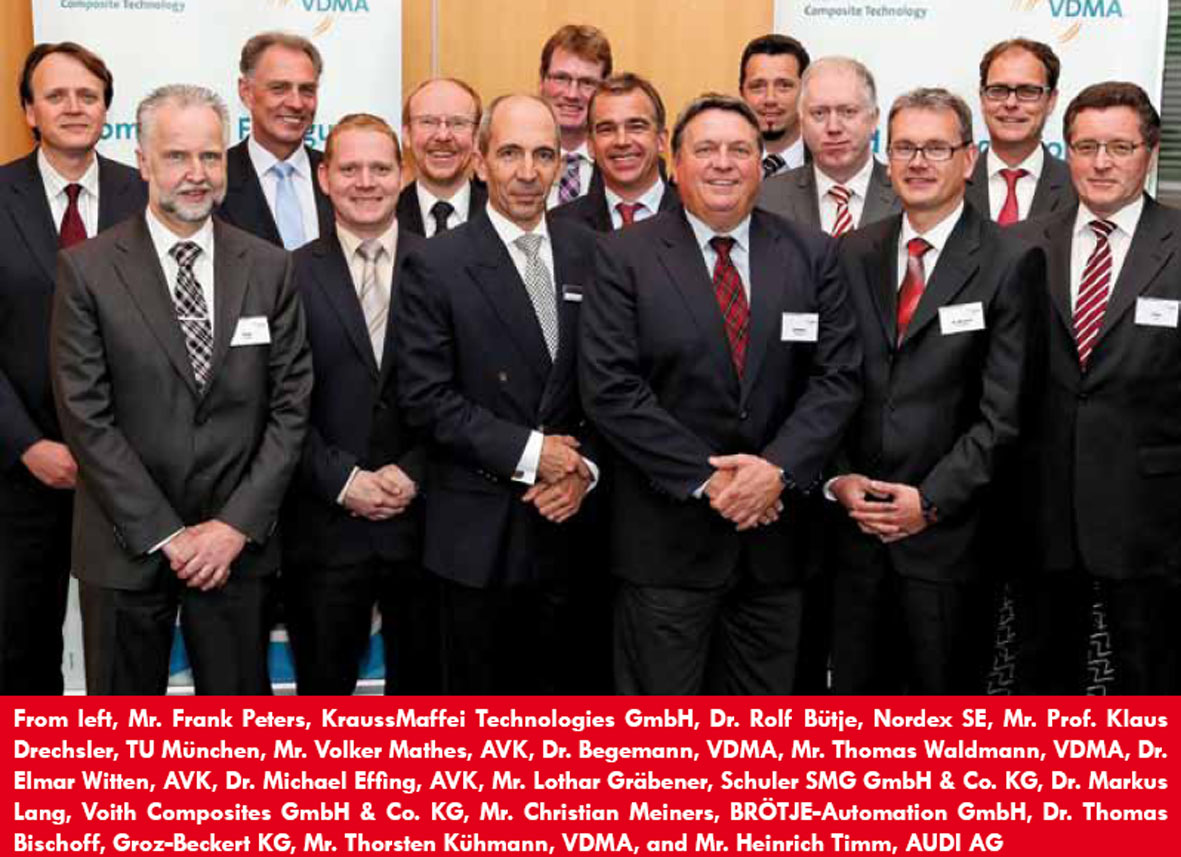 The members of the VDMA Composite Technology Forum and of the partner organisations AVK, Carbon Composites e.V. and CFK Valley Stade e.V., recently met in Frankfurt to discuss affordable manufacturing automation solutions along the entire process chain to help bring about the required reduction in the cost of finished products.
The members of the VDMA Composite Technology Forum and of the partner organisations AVK, Carbon Composites e.V. and CFK Valley Stade e.V., recently met in Frankfurt to discuss affordable manufacturing automation solutions along the entire process chain to help bring about the required reduction in the cost of finished products.
In his welcome address at the session, Frank Peters of KlaussMaffei Technologies GmbH Board highlighted the importance of close co-operation between machinery and plant manufacturers and the industry using fibre composites as well as among their various networks.
More than 150 delegates discussed approaches to automation and what was required of plant and machinery manufacturers, stressing the benefits of knowledge transfer for the necessary joint developments.
In his keynote address on the challenges of automation, Klaus Drechsler, Professor of Carbon Composites at Munich Technical University, identified carbon fibre-reinforced plastics (CRP) as having the greatest potential of all material systems in lightweight construction, with a possible 90 per cent saving in process costs.
 “Use of carbon fibre- reinforced plastics in industrial-scale production does however still require considerable research efforts, from the material sciences through structural mechanics to process engineering. Automation solutions from machinery and plant manufacturers are the key drivers for industrialisation,” he said.
“Use of carbon fibre- reinforced plastics in industrial-scale production does however still require considerable research efforts, from the material sciences through structural mechanics to process engineering. Automation solutions from machinery and plant manufacturers are the key drivers for industrialisation,” he said.
Composite component manufacturing will have to be overhauled completely if large-scale production is to be introduced in the motor industry, explained Heinrich Timm of AUDI AG. “Lightweight construction goes far beyond reducing consumption and emissions. Lightweight construction is also about the sustainable saving of resources and driving safety. That is why the focus is on lightweight more than ever before, inspiring ideas in composite construction ranging from steel and aluminium to fibre-reinforced materials. The best material for the purpose is the smallest possible quantity and in the right place: that is the way to economic lightweight construction. This means developing and automating the manufacturing and joining processes for the production line. VDMA’s current practice of exchanges between machinery and plant manufacturers and user industries is of utmost importance here.”
Lightweight components are increasingly being used for the new generation of motor vehicles in particular, especially to compensate for the weight of electric vehicle batteries and to cut fleet consumption overall.
There is no series manufacture without automation solutions. The use of fibre composites in series production requires reliable processes with short cycle times and a high degree of accuracy. At the same time, the prices of high-performance fibres will have to come down in order to be competitive. The challenges of automated manufacture arise at every stage: textile moulded part manufacture, cutting, handling of limp fabricated materials, injection and hardening processes, tool design, joining and assembly techniques, working and testing of components.
For all these questions, the Composite Technology Forum brings together more than 130 VDMA member-firms from eight associations to pursue the necessary developments jointly with the customer industries. With thermo process technology, textile machinery, garment and leather technology, plastics and rubber machinery, robotics and automation, machine tools, precision tools and testing machines, the entire process chain is covered, from fibre to finished component.